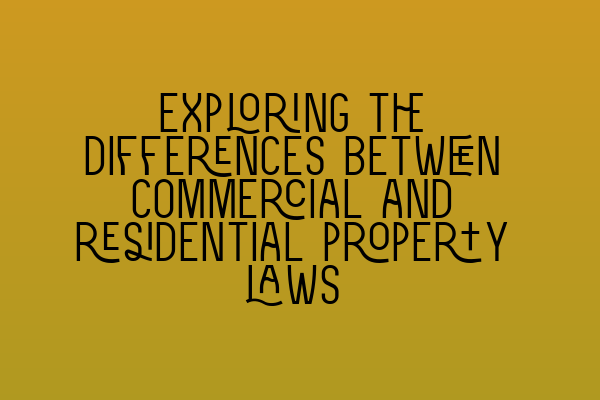Exploring the Differences Between Commercial and Residential Property Laws
Property law is a complex and multifaceted area of law that deals with the legal aspects of owning, leasing, and transferring property. Within property law, there are two primary categories: commercial and residential property. Both types of property are governed by specific laws and regulations that differentiate them from one another. In this article, we will explore the main differences between commercial and residential property laws.
What is Commercial Property?
Commercial property refers to buildings or land that are primarily used for business purposes. This can include office buildings, retail spaces, warehouses, and industrial facilities. The key characteristic of commercial property is that it is intended for commercial activities rather than residential use.
Key Differences in Legal Framework
One of the main differences between commercial and residential property laws is the legal framework that governs each type. Commercial property laws are generally more complex and intricate than residential property laws. This is due to the nature of commercial transactions, which often involve multiple parties, intricate lease agreements, and complex financing arrangements.
In contrast, residential property laws are typically more straightforward and designed to protect the rights and interests of individual homeowners. Residential property transactions usually involve fewer parties and simpler contractual agreements. However, it is important to note that residential property laws can vary depending on the jurisdiction, so it is crucial to consult with a qualified property lawyer or solicitor.
Lease Agreements and Tenancy
Another significant difference between commercial and residential property laws lies in lease agreements and tenancy. Commercial leases are generally longer and more detailed than residential leases. They often include provisions for rent escalation, maintenance responsibilities, and options to renew or terminate the lease. Additionally, commercial leases are typically negotiated between sophisticated parties, such as business owners and landlords, who have a higher level of knowledge and understanding of the legalities involved.
Residential leases, on the other hand, tend to be more standardized and provide greater protection to tenants. Residential tenancy laws are designed to ensure fair treatment and prevent landlord abuse. They often include provisions limiting rent increases, requiring notice for lease termination, and outlining the landlord’s responsibilities for repairs and maintenance.
Property Use and Zoning
Commercial and residential properties are subject to different zoning regulations. Zoning laws dictate how land can be used in specific areas and can vary significantly between commercial and residential zones.
Commercial zoning typically allows for a broader range of business activities, such as retail, office space, and industrial operations. On the other hand, residential zoning is designed for housing and restricts commercial activities within those zones. These zoning regulations are put in place to ensure that communities have a balance between the needs of businesses and residents.
It is important for property owners, developers, and commercial tenants to understand the zoning regulations and seek appropriate legal advice to ensure compliance with local zoning laws.
Conclusion
While both commercial and residential properties are subject to property laws, there are significant differences between the two. Commercial property laws have a more extensive legal framework, complex lease agreements, and are subject to specific zoning regulations that allow for a broader range of business activities. On the other hand, residential property laws focus on protecting the rights and interests of individual homeowners and provide greater tenant protection.
If you have any further questions about commercial or residential property laws or require legal advice, it is essential to consult with a qualified property lawyer or solicitor. At SQE Property Law & Land Law, we have a team of experienced solicitors who specialize in property law and can provide expert guidance tailored to your specific needs.
For more information about our services and preparation courses for the Solicitors Qualifying Examination (SQE), please visit our website:
